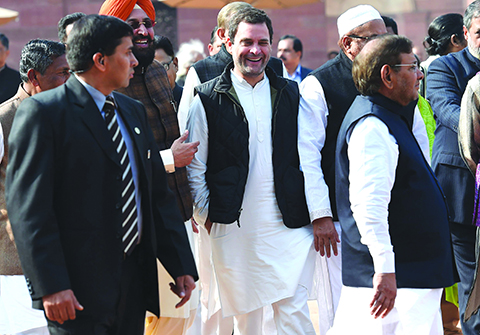 Congress party Vice-President Rahul Gandhi (C) leaves after meeting Indian President Pranab Mukherjee at the Presidential Palace in New Delhi on December 16, 2016.
Congress party Vice-President Rahul Gandhi (C) leaves after meeting Indian President Pranab Mukherjee at the Presidential Palace in New Delhi on December 16, 2016.India's Vice-President M Hamid Ansari Friday slammed lawmakers on the last day of parliament's stormy winter session December 16, which has been marred by daily disruptions and acrimonious sloganeering between government and opposition leaders. - AFP
NEW DELHI: India's parliament ended its latest session yesterday with barely any debate on a currency ban that has caused nationwide chaos, leading opposition parties to claim their democratic rights had been "trampled". Ruling and opposition politicians have traded bitter accusations of responsibility for the failure of parliament to function for almost all of the winter session.
It opened on November 16, a week after Prime Minister Narendra Modi announced a shock decision to withdraw all high-value notes from circulation-a move aimed at tackling corruption that is widely expected to hit economic growth. In a memorandum to the president, the Congress and several other opposition parties said they were "extremely pained by this trampling of our democratic rights" and warned the currency move could bring "economic disaster".
Modi, who has made a series of public speeches justifying his currency ban, has meanwhile accused the opposition of prevented him from speaking in parliament.
"I am not being allowed to speak in Lok Sabha (lower parliament house) so I am speaking in the Jan Sabha (people's gathering)," he tweeted earlier this month. India's two houses of parliament are notoriously rowdy and disruptions are routine, mostly due to loud protests that make it impossible for debates to proceed.
But the latest session has been particularly unproductive. This week, India's President Pranab Mukherjee made a rare intervention, urging politicians to use the streets rather than parliament for protest. In 2015, more than 20,000 Indians, including prominent business leaders, signed an online petition urging lawmakers to end weeks of rowdy protests that had paralyzed parliament. Parliament had witnessed disruptions through the month-long winter session as the government continued to refuse debate on demonetization issue.
Modi slams opposition
Most of the action, however, spilled outside Parliament yesterday. Modi slammed the Congress and left parties for opposing demonetization and said that "for Congress, the party is above the nation". The opposition counter attacked by submitting a memorandum to the PM, demanding loan waivers for debt-ridden farmers.
It also blamed the government for flouting democratic values and blocking the debate on note ban in Parliament. The centre's claim that note ban has hit black money holders in the country is widely contested by the opposition, who say the government's move to scrap Rs 500/1000 notes has hit poor the hardest.
Congress leader Mallikarjun Kharge said the parties wanted a debate in Parliament on demonetization but the government flouted all democratic values and blocked it. "We even agreed that discussion may happen without applying the rule. Ultimately, we stand with the poorest of the poor, with the common man of the country," adds TMC's Sudip Bandyopadhyay after taking the mantle. - agencies










